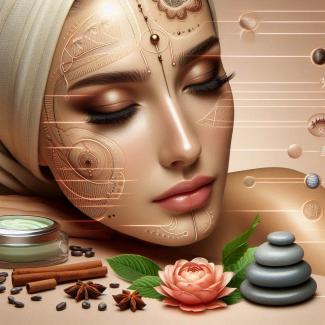
Ginkgo biloba, often referred to as the maidenhair tree, is one of the oldest living tree species, dating back over 200 million years. It is the sole survivor of an ancient group of trees that once populated the earth, earning it the title of a living fossil. Native to China, ginkgo trees are highly resilient and can live for thousands of years. They are easily recognizable by their unique fan-shaped leaves and yellow seeds.
Phytochemical Composition
Ginkgo biloba leaves are rich in flavonoids and terpenoids, which are believed to contribute to its medicinal properties. The key active components include:
- Flavonoids: Quercetin, kaempferol, and isorhamnetin, known for their antioxidant properties.
- Terpenoids: Ginkgolides and bilobalide, which are believed to improve blood flow and protect nerve cells.
Health Benefits
Ginkgo biloba has been studied extensively for its potential health benefits, which include:
- Cognitive Function:
- Memory Enhancement: Ginkgo biloba is renowned for its ability to improve cognitive function and memory. It is often used as a supplement to prevent or mitigate cognitive decline in conditions like Alzheimer’s disease and other forms of dementia.
- Mental Clarity: Many users report improved focus and mental clarity when taking ginkgo supplements.
- Circulatory Health:
- Improved Blood Flow: The terpenoids in ginkgo biloba help dilate blood vessels and reduce the stickiness of platelets, which can improve blood circulation and overall cardiovascular health.
- Peripheral Vascular Disease: It is often used to treat conditions caused by poor blood flow, such as intermittent claudication (pain caused by too little blood flow during exercise).
- Antioxidant Properties:
- Cellular Protection: The flavonoids in ginkgo biloba provide significant antioxidant protection, neutralizing free radicals that can cause cellular damage and contribute to aging and various diseases.
- Mood and Anxiety:
- Anxiolytic Effects: Ginkgo biloba has been shown to have mild anti-anxiety effects, potentially benefiting those with generalized anxiety disorder.
- Eye Health:
- Vision Improvement: Some studies suggest that ginkgo biloba can improve vision in individuals with glaucoma and age-related macular degeneration by enhancing blood flow to the eyes.
Effects on Sexuality
Ginkgo biloba is increasingly popular for its potential to improve various aspects of sexual health. Here are some ways it might influence sexuality:
- Erectile Dysfunction:
- Enhanced Blood Flow: By improving blood circulation, ginkgo biloba can help men achieve and maintain erections. Improved blood flow to the genital area is crucial for a healthy erectile function.
- Libido and Sexual Desire:
- Increased Libido: Some evidence suggests that ginkgo biloba can enhance libido in both men and women by boosting energy levels and reducing anxiety, which can otherwise dampen sexual desire.
- Sexual Performance: The reduction in anxiety and stress, coupled with improved circulation, can enhance overall sexual performance and satisfaction.
- Sexual Dysfunction in Women:
- Increased Arousal: For women, ginkgo biloba may help increase sexual arousal by enhancing blood flow to the genital region and improving overall mood and energy levels.
How to Obtain Ginkgo Biloba
Ginkgo biloba supplements are widely available and can be purchased in various forms:
- Capsules and Tablets: The most common form, typically standardized to contain a specific percentage of ginkgo flavonoids and terpenoids.
- Liquid Extracts: Concentrated forms that can be added to water or other beverages.
- Dried Leaves: Can be used to make teas or infusions.
- Ginkgo Tea: Pre-packaged tea bags containing dried ginkgo leaves.
Where to Buy:
- Health Food Stores: Most health food stores carry ginkgo biloba supplements.
- Pharmacies: Available in the dietary supplement section.
- Online Retailers: Widely available through e-commerce sites like Amazon, iHerb, and specialty supplement websites.
Substitutes for Ginkgo Biloba
While ginkgo biloba is unique, there are other herbs and supplements with similar benefits:
- Panax Ginseng:
- Known for improving energy, cognitive function, and sexual health. Often used in combination with ginkgo for synergistic effects.
- Bacopa Monnieri:
- Used in traditional Ayurvedic medicine for cognitive enhancement and reducing anxiety.
- Rhodiola Rosea:
- An adaptogen that helps the body manage stress, improve mood, and enhance cognitive function.
- Ashwagandha:
- Another adaptogen with a broad range of benefits, including stress reduction, improved cognitive function, and enhanced sexual health.
- L-Arginine:
- An amino acid that improves blood flow and is often used to treat erectile dysfunction.
- Hawthorn:
- Known for its cardiovascular benefits, including improving blood flow and heart health, which can indirectly benefit sexual function.
Safety and Considerations
While ginkgo biloba is generally safe for most people, it can interact with certain medications, including blood thinners, and may cause side effects like gastrointestinal upset, headache, and allergic reactions. It is crucial to consult with a healthcare provider before starting any new supplement, especially for individuals with underlying health conditions or those taking other medications.
Ginkgo biloba is a versatile and ancient supplement with a wide range of potential health benefits, particularly for cognitive function, circulation, and sexual health. Its unique phytochemical composition makes it a valuable addition to many health regimens. However, it is essential to use it responsibly and in consultation with healthcare professionals to ensure safety and efficacy.






